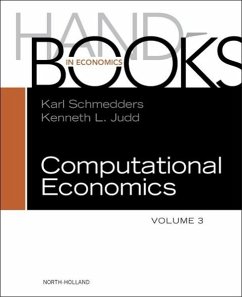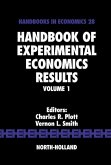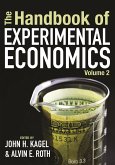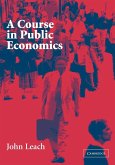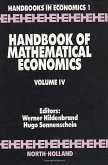Handbook of Computational Economics summarizes recent advances in economic thought, revealing some of the potential offered by modern computational methods. With computational power increasing in hardware and algorithms, many economists are closing the gap between economic practice and the frontiers of computational mathematics. In their efforts to accelerate the incorporation of computational power into mainstream research, contributors to this volume update the improvements in algorithms that have sharpened econometric tools, solution methods for dynamic optimization and equilibrium models, and applications to public finance, macroeconomics, and auctions. They also cover the switch to massive parallelism in the creation of more powerful computers, with advances in the development of high-power and high-throughput computing.
Much more can be done to expand the value of computational modeling in economics. In conjunction with volume one (1996) and volume two (2006),this volume offers a remarkable picture of the recent development of economics as a science as well as an exciting preview of its future potential.
Hinweis: Dieser Artikel kann nur an eine deutsche Lieferadresse ausgeliefert werden.
Much more can be done to expand the value of computational modeling in economics. In conjunction with volume one (1996) and volume two (2006),this volume offers a remarkable picture of the recent development of economics as a science as well as an exciting preview of its future potential.
Hinweis: Dieser Artikel kann nur an eine deutsche Lieferadresse ausgeliefert werden.
"...indispensable reference works which belong in every professional collection, and form ideal supplementary reading for graduate economics students on advanced courses." --Zentralblatt MATH, Sep-14
"In this volume the best experts show the breadth and depth of the state of the art of computational tools ready to accurately compute solutions and equilibria with a wide range of applications and models in macroeconomics and finance." --Cars Hommes, University of Amsterdam
"Volume 3 of the Handbook of Computational Economics, which reviews the development of computational algorithms yielding approximate equilibrium solutions for analytically modeled dynamic economic systems, provides a useful complement to Volume 2, which introduced agent-based computational economic (ACE) modeling tools for the computational study of economic processes as open-ended dynamic systems of interacting agents. Particular attention is focused on dynamic stochastic models that generalize traditional assumptions regarding agent heterogeneity, preference specifications, decision horizons, state-space characteristics, market imperfections, idiosyncratic risks, and aggregate uncertainty. Building on earlier simulation techniques, the computational algorithms incorporate recent advances in projection methods and perturbation techniques." --Leigh Tesfatsion, Iowa State University
"In this volume the best experts show the breadth and depth of the state of the art of computational tools ready to accurately compute solutions and equilibria with a wide range of applications and models in macroeconomics and finance." --Cars Hommes, University of Amsterdam
"Volume 3 of the Handbook of Computational Economics, which reviews the development of computational algorithms yielding approximate equilibrium solutions for analytically modeled dynamic economic systems, provides a useful complement to Volume 2, which introduced agent-based computational economic (ACE) modeling tools for the computational study of economic processes as open-ended dynamic systems of interacting agents. Particular attention is focused on dynamic stochastic models that generalize traditional assumptions regarding agent heterogeneity, preference specifications, decision horizons, state-space characteristics, market imperfections, idiosyncratic risks, and aggregate uncertainty. Building on earlier simulation techniques, the computational algorithms incorporate recent advances in projection methods and perturbation techniques." --Leigh Tesfatsion, Iowa State University

